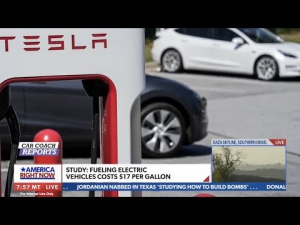Is Toyota Against Electric Vehicles?
More automakers are pushing for an all-electric future. Mercedes and Jaguar are committed to an electric vehicle lineup by 2025, and Ford and Chevy are duking it out in the electric truck segment. But Toyota has only just teased their bZ4x concept, a slow start to the electric car game. But recent acts in congress make the company seem anti-green, a surprising move from a company that was once a frontrunner for clean energy.
Toyota pushes Congress to slow the electric vehicle shift
Electric vehicle tax credits are used to incentivize electric cars. And Biden’s EV plans focus on making them affordable for the consumer, as well as finding ways to recycle batteries. These are all excellent steps in the right direction. But according to The New York Times, a Toyota executive discussed stepping on the brakes a bit.
Chris Reynolds, an executive responsible for handling government affairs, presented the argument that, while not opposed to an all-electric future, 98% of cars sold today are powered by gasoline in some capacity. Therefore, the government should focus on hybrids and hydrogen fuel cell vehicles over electric.
While certainly a fair point, as hybrids produce fewer emissions than gas-powered cars, the subtext of their argument is clear: they’re not ready to make the switch. Toyota relies on hybrids, and a rapid switch to all-electric cars could devastate the brand.
This isn’t the first time Toyota has pushed against climate-based regulations. In 2019, Toyota backed the Trump administration as they fought against California’s stricter emissions restrictions. And they’ve vocalized against fuel consumption regulations in Mexico according to Reuters. So Toyota’s stance on electric cars is a bit convoluted, saying they support the transition, but not the 10 to 20-year timeframe.
Toyota’s fall from clean car grace

Toyota supported fuel-sipping green cars earlier than most automakers, despite the actions they’re taking today. They introduced the first-generation Toyota Prius in 1997, just one year after the infamous EV1. But unlike GM’s electric car, the Prius would become a mass-produced and highly successful hybrid.
And in the early 2010s, the automaker partnered with Tesla to create a somewhat disappointing electric Rav4. Granted, it served as a “compliance car,” only sold in California to meet their emissions standards. But they’ve laid the groundwork for electric vehicles before, so why not now?
But most of all, Toyota has banked on hydrogen fuel cell technology in recent years. The Toyota Mirai released back in 2014 was the first mass-produced hydrogen fuel cell car, and just received its second generation. But the downside is that it’s only available in California since there isn’t really a hydrogen network anywhere else in the country.
When will Toyota release an electric car?

In short, it seems Toyota bet on the wrong horse in terms of renewable energy, with fuel cell infrastructures being nonexistent in the states. But the all-electric bZX4 is on its way, set to hit showrooms in 2022. And other models will be added to their BZ (beyond zero) lineup by 2025. But there’s no denying they’re off to a slow start.
RELATED: 5 Automakers With the Worst Electric Vehicle Programs
The post Is Toyota Against Electric Vehicles? appeared first on MotorBiscuit.







